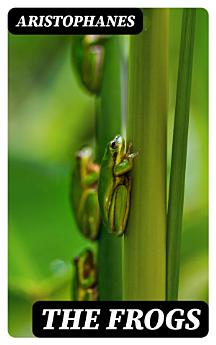關於這本電子書
In "The Frogs," Aristophanes skillfully combines comedy and social critique to explore themes of art, politics, and the afterlife within the context of Athenian drama. This satirical play, structured as a journey to the underworld, showcases Aristophanes' hallmark use of clever wordplay, vivid characters, and biting humor. As the protagonist, Dionysus, embarks on a quest to retrieve the playwright Euripides, the narrative serves as both a reflection on the decline of Athenian drama and a critique of contemporaneous political landscapes. The interactions between the dead poets serve as a vehicle for Aristophanes to express his perspective on the state of tragedy and the cultural shifts in Athens, illustrating the fragility and vitality of artistic expression amidst societal change. Aristophanes, often referred to as the 'father of comedy,' lived during the tumultuous periods of the Peloponnesian War and reflected the zeitgeist of his times through his work. His sharp wit and keen observations of Athenian life illuminate the socio-political issues faced by citizens. Aristophanes had a profound interest in the theatre's role as a social commentator, which is central to "The Frogs," as it invites audiences to consider the value of both art and the artist within their society. "The Frogs" is an essential read for enthusiasts of classic literature and those interested in the interplay between comedy and tragedy. With its rich layers of meaning and cultural critique, this play not only entertains but also provokes thoughtful reflection on the role of the arts in society. Aristophanes' masterful blend of humor and philosophy offers valuable insights that resonate even in contemporary contexts, making this work a timeless exploration of the human condition.
關於作者
Aristophanes (born c. 446 BC – died c. 386 BC), the towering figure of ancient Greek comedy, remains a prominent literary and cultural icon for his sharp wit and poignant satire. A playwright of the classical era, Aristophanes wielded his comic plays as a vehicle for social commentary, often targeting the political climate of Athens during the Peloponnesian War. As a creator of the genre known as Old Comedy, his work is characterized by its fearless engagement with the most controversial topics of his time, from war to societal norms. Among the eleven surviving plays, 'The Frogs' stands out as a pinnacle of comedic literature. Written in 405 BC, this comedic masterpiece dips into the realms of literary criticism, as Dionysus, the god of wine and theatre, embarks on a journey to Hades to bring Euripides back from the dead. Through Dionysus's exploits and a contest of poetic skill between Euripides and Aeschylus, Aristophanes offers a profound meditation on the nature of theatre and the purpose of art. His works, such as 'The Frogs,' demonstrate the enduring nature of classical literature and provide a lens through which the socio-political complexities of ancient Greece can be understood in a contemporary context.
為這本電子書評分
請分享你的寶貴意見。
閱讀資訊
智能手機和平板電腦
手提電腦和電腦
你可以使用電腦的網絡瀏覽器聆聽在 Google Play 上購買的有聲書。
電子書閱讀器及其他裝置
如要在 Kobo 等電子墨水裝置上閱覽書籍,你需要下載檔案並傳輸到你的裝置。請按照說明中心的詳細指示,將檔案傳輸到支援的電子書閱讀器。







